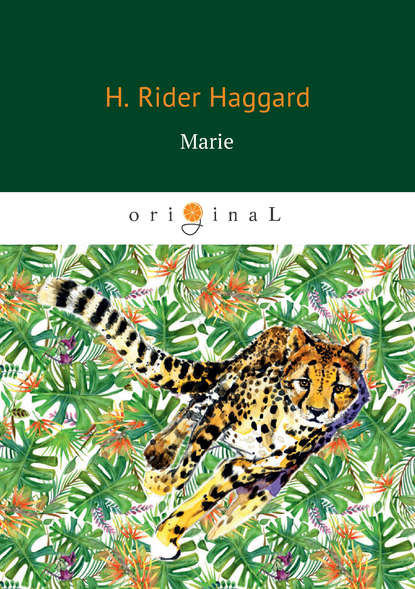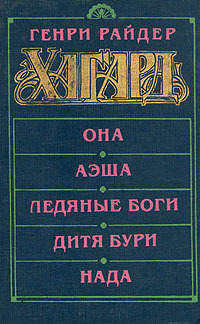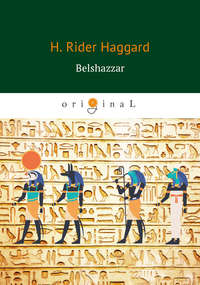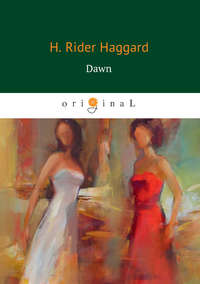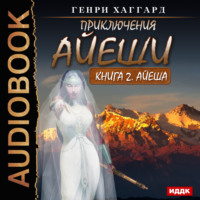
Полная версия
Child of Storm & Magepa the Buck
Then I forgot these scenic accessories in the sight of the man himself. There he sat on a stool in front of his hut, quite unattended, and wearing only a cloak of leopard skins open in front, for he was unadorned with the usual hideous trappings of a witch-doctor, such as snake-skins, human bones, bladders full of unholy compounds, and so forth.
What a man he was, if indeed he could be called quite human. His stature, though stout, was only that of a child; his head was enormous, and from it plaited white hair fell down on to his shoulders. His eyes were deep and sunken, his face was broad and very stern. Except for this snow-white hair, however, he did not look ancient, for his flesh was firm and plump, and the skin on his cheeks and neck unwrinkled, which suggested to me that the story of his great antiquity was false. A man who was over a hundred years old, for instance, surely could not boast such a beautiful set of teeth, for even at that distance I could see them gleaming. On the other hand, evidently middle age was far behind him; indeed, from his appearance it was quite impossible to guess even approximately the number of his years. There he sat, red in the red light, perfectly still, and staring without a blink of his eyes at the furious ball of the setting sun, as an eagle is said to be able to do.
Saduko advanced, and I walked after him. My stature is not great, and I have never considered myself an imposing person, but somehow I do not think that I ever felt more insignificant than on this occasion. The tall and splendid native beside, or rather behind whom I walked, the gloomy magnificence of the place, the blood-red light in which it was bathed, and the solemn, solitary, little figure with wisdom stamped upon its face before me, all tended to induce humility in a man not naturally vain. I felt myself growing smaller and smaller, both in a moral and a physical sense; I wished that my curiosity had not prompted me to seek an interview with yonder uncanny being.
Well, it was too late to retreat; indeed, Saduko was already standing before the dwarf and lifting his right arm above his head as he gave him the salute of “Makosi![4]” whereon, feeling that something was expected of me, I took off my shabby cloth hat and bowed, then, remembering my white man’s pride, replaced it on my head.
The wizard suddenly seemed to become aware of our presence, for, ceasing his contemplation of the sinking sun, he scanned us both with his slow, thoughtful eyes, which somehow reminded me of those of a chameleon, although they were not prominent, but, as I have said, sunken.
“Greeting, son Saduko!” he said in a deep, rumbling voice. “Why are you back here so soon, and why do you bring this flea of a white man with you?”
Now this was more than I could bear, so without waiting for my companion’s answer I broke in:
“You give me a poor name, O Zikali. What would you think of me if I called you a beetle of a wizard?”
“I should think you clever,” he answered after reflection, “for after all I must look something like a beetle with a white head. But why should you mind being compared to a flea? A flea works by night and so do you, Macumazahn; a flea is active and so are you; a flea is very hard to catch and kill and so are you; and lastly a flea drinks its fill of that which it desires, the blood of man and beast, and so you have done, do, and will, Macumazahn,” and he broke into a great laugh that rolled and echoed about the rocky roof above.
Once, long years before, I had heard that laugh, when I was a prisoner in Dingaan’s kraal, after the massacre of Retief and his company, and I recognised it again.
While I was searching for some answer in the same vein, and not finding it, though I thought of plenty afterwards, ceasing of a sudden from his unseemly mirth, he went on:
“Do not let us waste time in jests, for it is a precious thing, and there is but little of it left for any one of us. Your business, son Saduko?”
“Baba!” (that is the Zulu for father), said Saduko, “this white Inkoosi, for, as you know well enough, he is a chief by nature, a man of a great heart and doubtless of high blood [this, I believe, is true, for I have been told that my ancestors were more or less distinguished, although, if this is so, their talents did not lie in the direction of money-making], has offered to take me upon a shooting expedition and to give me a good gun with two mouths in payment of my services. But I told him I could not engage in any fresh venture without your leave, and – he is come to see whether you will grant it, my father.”
“Indeed,” answered the dwarf, nodding his great head. “This clever white man has taken the trouble of a long walk in the sun to come here to ask me whether he may be allowed the privilege of presenting you with a weapon of great value in return for a service that any man of your years in Zululand would love to give for nothing in such company?
“Son Saduko, because my eye-holes are hollow, do you think it your part to try to fill them up with dust? Nay, the white man has come because he desires to see him who is named Opener-of-Roads, of whom he heard a great deal when he was but a lad, and to judge whether in truth he has wisdom, or is but a common cheat. And you have come to learn whether or no your friendship with him will be fortunate; whether or no he will aid you in a certain enterprise that you have in your mind.”
“True, O Zikali,” I said. “That is so far as I am concerned.”
But Saduko answered nothing.
“Well,” went on the dwarf, “since I am in the mood I will try to answer both your questions, for I should be a poor Nyanga” [that is doctor] “if I did not when you have travelled so far to ask them. Moreover, O Macumazana, be happy, for I seek no fee who, having made such fortune as I need long ago, before your father was born across the Black Water, Macumazahn, no longer work for a reward – unless it be from the hand of one of the House of Senzangakona – and therefore, as you may guess, work but seldom.”
Then he clapped his hands, and a servant appeared from somewhere behind the hut, one of those fierce-looking men who had stopped us at the gate. He saluted the dwarf and stood before him in silence and with bowed head.
“Make two fires,” said Zikali, “and give me my medicine.”
The man fetched wood, which he built into two little piles in front of Zikali. These piles he fired with a brand brought from behind the hut. Then he handed his master a catskin bag.
“Withdraw,” said Zikali, “and return no more till I summon you, for I am about to prophesy. If, however, I should seem to die, bury me to-morrow in the place you know of and give this white man a safe-conduct from my kraal.”
The man saluted again and went without a word.
When he had gone the dwarf drew from the bag a bundle of twisted roots, also some pebbles, from which he selected two, one white and the other black.
“Into this stone,” he said, holding up the white pebble so that the light from the fire shone on it – since, save for the lingering red glow, it was now growing dark – “into this stone I am about to draw your spirit, O Macumazana; and into this one” – and he held up the black pebble – “yours, O Son of Matiwane. Why do you look frightened, O brave White Man, who keep saying in your heart, ‘He is nothing but an ugly old Kafir cheat’? If I am a cheat, why do you look frightened? Is your spirit already in your throat, and does it choke you, as this little stone might do if you tried to swallow it?” and he burst into one of his great, uncanny laughs.
I tried to protest that I was not in the least frightened, but failed, for, in fact, I suppose my nerves were acted on by his suggestion, and I did feel exactly as though that stone were in my throat, only coming upwards, not going downwards. “Hysteria,” thought I to myself, “the result of being overtired,” and as I could not speak, sat still as though I treated his gibes with silent contempt.
“Now,” went on the dwarf, “perhaps I shall seem to die; and if so do not touch me lest you should really die. Wait till I wake up again and tell you what your spirits have told me. Or if I do not wake up – for a time must come when I shall go on sleeping – well – for as long as I have lived – after the fires are quite out, not before, lay your hands upon my breast; and if you find me turning cold, get you gone to some other Nyanga as fast as the spirits of this place will let you, O ye who would peep into the future.”
As he spoke he threw a big handful of the roots that I have mentioned on to each of the fires, whereon tall flames leapt up from them, very unholy-looking flames which were followed by columns of dense, white smoke that emitted a most powerful and choking odour quite unlike anything that I had ever smelt before. It seemed to penetrate all through me, and that accursed stone in my throat grew as large as an apple and felt as though someone were poking it upwards with a stick.
Next he threw the white pebble into the right-hand fire, that which was opposite to me, saying:
“Enter, Macumazahn, and look,” and the black pebble he threw into the left-hand fire saying: “Enter, Son of Matiwane, and look. Then come back both of you and make report to me, your master.”
Now it is a fact that as he said these words I experienced a sensation as though a stone had come out of my throat; so readily do our nerves deceive us that I even thought it grated against my teeth as I opened my mouth to give it passage. At any rate the choking was gone, only now I felt as though I were quite empty and floating on air, as though I were not I, in short, but a mere shell of a thing, all of which doubtless was caused by the stench of those burning roots. Still I could look and take note, for I distinctly saw Zikali thrust his huge head, first into the smoke of what I will call my fire, next into that of Saduko’s fire, and then lean back, blowing the stuff in clouds from his mouth and nostrils. Afterwards I saw him roll over on to his side and lie quite still with his arms outstretched; indeed, I noticed that one of his fingers seemed to be in the left-hand fire and reflected that it would be burnt off. In this, however, I must have been mistaken, since I observed subsequently that it was not even scorched.
Thus Zikali lay for a long while till I began to wonder whether he were not really dead. Dead enough he seemed to be, for no corpse could have stayed more stirless. But that night I could not keep my thoughts fixed on Zikali or anything. I merely noted these circumstances in a mechanical way, as might one with whom they had nothing whatsoever to do. They did not interest me at all, for there appeared to be nothing in me to be interested, as I gathered according to Zikali, because I was not there, but in a warmer place than I hope ever to occupy, namely, in the stone in that unpleasant-looking, little right-hand fire.
So matters went as they might in a dream. The sun had sunk completely, not even an after-glow was left. The only light remaining was that from the smouldering fires, which just sufficed to illumine the bulk of Zikali, lying on his side, his squat shape looking like that of a dead hippopotamus calf. What was left of my consciousness grew heartily sick of the whole affair; I was tired of being so empty.
At length the dwarf stirred. He sat up, yawned, sneezed, shook himself, and began to rake among the burning embers of my fire with his naked hand. Presently he found the white stone, which was now red-hot – at any rate it glowed as though it were – and after examining it for a moment finally popped it into his mouth! Then he hunted in the other fire for the black stone, which he treated in a similar fashion. The next thing I remember was that the fires, which had died away almost to nothing, were burning very brightly again, I suppose because someone had put fuel on them, and Zikali was speaking.
“Come here, O Macumazana and O Son of Matiwane,” he said, “and I will repeat to you what your spirits have been telling me.”
We drew near into the light of the fires, which for some reason or other was extremely vivid. Then he spat the white stone from his mouth into his big hand, and I saw that now it was covered with lines and patches like a bird’s egg.
“You cannot read the signs?” he said, holding it towards me; and when I shook my head went on: “Well, I can, as you white men read a book. All your history is written here, Macumazahn; but there is no need to tell you that, since you know it, as I do well enough, having learned it in other days, the days of Dingaan, Macumazahn. All your future, also, a very strange future,” and he scanned the stone with interest. “Yes, yes; a wonderful life, and a noble death far away. But of these matters you have not asked me, and therefore I may not tell them even if I wished, nor would you believe if I did. It is of your hunting trip that you have asked me, and my answer is that if you seek your own comfort you will do well not to go. A pool in a dry river-bed; a buffalo bull with the tip of one horn shattered. Yourself and the bull in the pool. Saduko, yonder, also in the pool, and a little half-bred man with a gun jumping about upon the bank. Then a litter made of boughs and you in it, and the father of Mameena walking lamely at your side. Then a hut and you in it, and the maiden called Mameena sitting at your side.
“Macumazahn, your spirit has written on this stone that you should beware of Mameena, since she is more dangerous than any buffalo. If you are wise you will not go out hunting with Umbezi, although it is true that hunt will not cost you your life. There, away, Stone, and take your writings with you!” and as he spoke he jerked his arm and I heard something whiz past my face.
Next he spat out the black stone and examined it in similar fashion.
“Your expedition will be successful, Son of Matiwane,” he said. “Together with Macumazahn you will win many cattle at the cost of sundry lives. But for the rest – well, you did not ask me of it, did you? Also, I have told you something of that story before to-day. Away, Stone!” and the black pebble followed the white out into the surrounding gloom.
We sat quite still until the dwarf broke the deep silence with one of his great laughs.
“My witchcraft is done,” he said. “A poor tale, was it not? Well, hunt for those stones to-morrow and read the rest of it if you can. Why did you not ask me to tell you everything while I was about it, White Man? It would have interested you more, but now it has all gone from me back into your spirit with the stones. Saduko, get you to sleep. Macumazahn, you who are a Watcher-by-Night, come and sit with me awhile in my hut, and we will talk of other things. All this business of the stones is nothing more than a Kafir trick, is it, Macumazahn? When you meet the buffalo with the split horn in the pool of a dried river, remember it is but a cheating trick, and now come into my hut and drink a kamba [bowl] of beer and let us talk of other things more interesting.”
So he took me into the hut, which was a fine one, very well lighted by a fire in its centre, and gave me Kafir beer to drink, that I swallowed gratefully, for my throat was dry and still felt as though it had been scraped.
“Who are you, Father?” I asked point-blank when I had taken my seat upon a low stool, with my back resting against the wall of the hut, and lit my pipe.
He lifted his big head from the pile of karosses on which he was lying and peered at me across the fire.
“My name is Zikali, which means ‘Weapons,’ White Man. You know as much as that, don’t you?” he answered. “My father ‘went down’ so long ago that his does not matter. I am a dwarf, very ugly, with some learning, as we of the Black House understand it, and very old. Is there anything else you would like to learn?”
“Yes, Zikali; how old?”
“There, there, Macumazahn, as you know, we poor Kafirs cannot count very well. How old? Well, when I was young I came down towards the coast from the Great River, you call it the Zambesi, I think, with Undwandwe, who lived in the north in those days. They have forgotten it now because it is some time ago, and if I could write I would set down the history of that march, for we fought some great battles with the people who used to live in this country. Afterwards I was the friend of the Father of the Zulus, he whom they still call Inkoosi Umkulu – the mighty chief – you may have heard tell of him. I carved that stool on which you sit for him and he left it back to me when he died.”
“Inkoosi Umkulu!” I exclaimed. “Why, they say he lived hundreds of years ago.”
“Do they, Macumazahn? If so, have I not told you that we black people cannot count as well as you do? Really it was only the other day. Anyhow, after his death the Zulus began to maltreat us Undwandwe and the Quabies and the Tetwas with us – you may remember that they called us the Amatefula, making a mock of us. So I quarrelled with the Zulus and especially with Chaka, he whom they named ‘Uhlanya’ [the Mad One]. You see, Macumazahn, it pleased him to laugh at me because I am not as other men are. He gave me a name which means ‘The-thing-which-should-never-have-been-born.’ I will not speak that name, it is secret to me, it may not pass my lips. Yet at times he sought my wisdom, and I paid him back for his names, for I gave him very ill counsel, and he took it, and I brought him to his death, although none ever saw my finger in that business. But when he was dead at the hands of his brothers Dingaan and Umhlangana and of Umbopa, Umbopa who also had a score to settle with him, and his body was cast out of the kraal like that of an evil-doer, why I, who because I was a dwarf was not sent with the men against Sotshangana, went and sat on it at night and laughed thus,” and he broke into one of his hideous peals of merriment.
“I laughed thrice: once for my wives whom he had taken; once for my children whom he had slain; and once for the mocking name that he had given me. Then I became the counsellor of Dingaan, whom I hated worse than I had hated Chaka, for he was Chaka again without his greatness, and you know the end of Dingaan, for you had a share in that war, and of Umhlangana, his brother and fellow-murderer, whom I counselled Dingaan to slay. This I did through the lips of the old Princess Menkabayi, Jama’s daughter, Senzangakona’s sister, the Oracle before whom all men bowed, causing her to say that ‘This land of the Zulus cannot be ruled by a crimson assegai.’ For, Macumazahn, it was Umhlangana who first struck Chaka with the spear. Now Panda reigns, the last of the sons of Senzangakona, my enemy, Panda the Fool, and I hold my hand from Panda because he tried to save the life of a child of mine whom Chaka slew. But Panda has sons who are as Chaka was, and against them I work as I worked against those who went before them.”
“Why?” I asked.
“Why? Oh! if I were to tell you all my story you would understand why, Macumazahn. Well, perhaps I will one day.” (Here I may state that as a matter of fact he did, and a very wonderful tale it is, but as it has nothing to do with this history I will not write it here.)
“I dare say,” I answered. “Chaka and Dingaan and Umhlangana and the others were not nice people. But another question. Why do you tell me all this, O Zikali, seeing that were I but to repeat it to a talking-bird you would be smelt out and a single moon would not die before you do?”
“Oh! I should be smelt out and killed before one moon dies, should I? Then I wonder that this has not happened during all the moons that are gone. Well, I tell the story to you, Macumazahn, who have had so much to do with the tale of the Zulus since the days of Dingaan, because I wish that someone should know it and perhaps write it down when everything is finished. Because, too, I have just been reading your spirit and see that it is still a white spirit, and that you will not whisper it to a ‘talking-bird.’”
Now I leant forward and looked at him.
“What is the end at which you aim, O Zikali?” I asked. “You are not one who beats the air with a stick; on whom do you wish the stick to fall at last?”
“On whom?” he answered in a new voice, a low, hissing voice. “Why, on these proud Zulus, this little family of men who call themselves the ‘People of Heaven,’ and swallow other tribes as the great tree-snake swallows kids and small bucks, and when it is fat with them cries to the world, ‘See how big I am! Everything is inside of me.’ I am a Ndwande, one of those peoples whom it pleases the Zulus to call ‘Amatefula’ – poor hangers-on who talk with an accent, nothing but bush swine. Therefore I would see the swine tusk the hunter. Or, if that may not be, I would see the black hunter laid low by the rhinoceros, the white rhinoceros of your race, Macumazahn, yes, even if it sets its foot upon the Ndwande boar as well. There, I have told you, and this is the reason that I live so long, for I will not die until these things have come to pass, as come to pass they will. What did Chaka, Senzangakona’s son, say when the little red assegai, the assegai with which he slew his mother, aye and others, some of whom were near to me, was in his liver? What did he say to Mbopa and the princes? Did he not say that he heard the feet of a great white people running, of a people who should stamp the Zulus flat? Well, I, ‘The-thing-who-should-not-have-been-born,’ live on until that day comes, and when it comes I think that you and I, Macumazahn, shall not be far apart, and that is why I have opened out my heart to you, I who have knowledge of the future. There, I speak no more of these things that are to be, who perchance have already said too much of them. Yet do not forget my words. Or forget them if you will, for I shall remind you of them, Macumazahn, when the feet of your people have avenged the Ndwandes and others whom it pleases the Zulus to treat as dirt.”
Now, this strange man, who had sat up in his excitement, shook his long white hair which, after the fashion of wizards, be wore plaited into thin ropes, till it hung like a veil about him, hiding his broad face and deep eyes. Presently he spoke again through this veil of hair, saying:
“You are wondering, Macumazahn, what Saduko has to do with all these great events that are to be. I answer that he must play his part in them; not a very great part, but still a part, and it is for this purpose that I saved him as a child from Bangu, Dingaan’s man, and reared him up to be a warrior, although, since I cannot lie, I warned him that he would do well to leave spears alone and follow after wisdom. Well, he will slay Bangu, who now has quarrelled with Panda, and a woman will come into the story, one Mameena, and that woman will bring about war between the sons of Panda, and from this war shall spring the ruin of the Zulus, for he who wins will be an evil king to them and bring down on them the wrath of a mightier race. And so ‘The-thing-that-should-not-have-been-born’ and the Ndwandes and the Quabies and Twetwas, whom it has pleased the conquering Zulus to name ‘Amatefula,’ shall be avenged. Yes, yes, my Spirit tells me all these things, and they are true.”
“And what of Saduko, my friend and your fosterling?”
“Saduko, your friend and my fosterling, will take his appointed road, Macumazahn, as I shall and you will. What more could he desire, seeing it is that which he has chosen? He will take his road and he will play the part which the Great-Great has prepared for him. Seek not to know more. Why should you, since Time will tell you the story? And now go to rest, Macumazahn, as I must who am old and feeble. And when it pleases you to visit me again, we will talk further. Meanwhile, remember always that I am nothing but an old Kafir cheat who pretends to a knowledge that belongs to no man. Remember it especially, Macumazahn, when you meet a buffalo with a split horn in the pool of a dried-up river, and afterwards, when a woman named Mameena makes a certain offer to you, which you may be tempted to accept. Good night to you, Watcher-by-Night with the white heart and the strange destiny, good night to you, and try not to think too hardly of the old Kafir cheat who just now is called ‘Opener-of-Roads.’ My servant waits without to lead you to your hut, and if you wish to be back at Umbezi’s kraal by nightfall to-morrow, you will do well to start ere sunrise, since, as you found in coming, Saduko, although he may be a fool, is a very good walker, and you do not like to be left behind, Macumazahn, do you?”
So I rose to go, but as I went some impulse seemed to take him and he called me back and made me sit down again.



